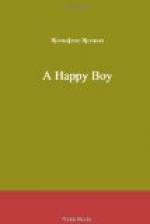The school-master waited for Oyvind until the latter had gathered together his books, then said that he would accompany him home. They walked slowly along. At first Oyvind was silent and his struggle went on, but gradually he gained his self-control. He was convinced that what had occurred was the best thing that in any way could have happened to him; and before he reached home, his belief in this had become so strong that he gave thanks to his God, and told the school-master so.
“Yes, now we can think of accomplishing something in life,” said the school-master, “instead of playing blind-man’s buff, and chasing after numbers. What do you say to the seminary?”
“Why, I should like very much to go there.”
“Are you thinking of the agricultural school?”
“Yes.”
“That is, without doubt, the best; it provides other openings than a school-master’s position.”
“But how can I go there? I earnestly desire it, but I have not the means.”
“Be industrious and good, and I dare say the means will be found.”
Oyvind felt completely overwhelmed with gratitude. His eyes sparkled, his breath came lightly, he glowed with that infinite love that bears us along when we experience some unexpected kindness from a fellow-creature. At such a moment, we fancy that our whole future will be like wandering in the fresh mountain air; we are wafted along more than we walk.
When they reached home both parents were within, and had been sitting there in quiet expectation, although it was during working hours of a busy time. The school-master entered first, Oyvind followed; both were smiling.
“Well?” said the father, laying aside a hymn-book, in which he had just been reading a “Prayer for a Confirmation Candidate.”
His mother stood by the hearth, not daring to say anything; she was smiling, but her hand was trembling. Evidently she was expecting good news, but did not wish to betray herself.
“I merely had to come to gladden you with the news, that he answered every question put to him; and that the priest said, when Oyvind had left him, that he had never had a more apt scholar.”
“Is it possible!” said the mother, much affected.
“Well, that is good,” said his father, clearing his throat unsteadily.
After it had been still for some time, the mother asked, softly,—
“What number will he have?”
“Number nine or ten,” said the school-master, calmly.
The mother looked at the father; he first at her, then at Oyvind, and said,—
“A houseman’s son can expect no more.”
Oyvind returned his gaze. Something rose up in his throat once more, but he hastily forced himself to think of things that he loved, one by one, until it was choked down again.
“Now I had better go,” said the school-master, and nodding, turned away.
Both parents followed him as usual out on the door-step; here the school-master took a quid of tobacco, and smiling said,—




